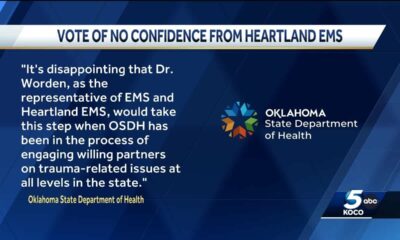Mississippi Today
Energy proposals include calling natural gas ‘clean,’ pausing wind projects
A bill that passed out of the Senate Energy Committee on Wednesday would label natural gas, the predominant energy source in Mississippi, “clean energy” despite its greenhouse gas emissions.
Sen. Joel Carter, R-Gulfport, introduced Senate Bill 2231, and explained the idea behind it is to take advantage of clean energy benefits as well as to avoid federal regulations that might punish the use of non-clean energy.

“Our footprint in Mississippi is largely natural gas,” Carter told Mississippi Today on Thursday. “If we weren’t able to use natural gas for some reason — if the federal government outlawed it or put restrictions on it — it would be detrimental to the economic development in our state.”
When asked how natural gas could be considered a clean energy, the senator described a “gray area” around what is and isn’t considered clean.
“There’s going to be people that make arguments that oil is clean energy,” Carter, who chairs the Energy Committee, said. “There’s a lot of arguments, there’s a lot of gray area, and that’s what we attempted to do is remove some gray area as to what clean energy is considered in Mississippi.”
Ohio and Tennessee passed similar laws in 2023, and in 2024 Louisiana Gov. Jeff Landry signed a proclamation stating natural gas is clean.
Natural gas is widely considered cleaner than coal as an energy source, but burning gas still produces carbon emissions, and methane that leaks out through the extraction and transportation of gas is much more potent than carbon dioxide in terms of trapping heat in the atmosphere. Definitions of clean energy in multiple academic resources, as well as the U.S. Department of Energy’s website, exclude natural gas.

Daniel Tait, research and communications director for the Energy and Policy Institute, blasted the proposal.
“This is a joke,” Tait said. “Natural gas is not clean.”
The Senate committee also amended the bill, which Carter admitted may “need some work” on the floor, that includes an amendment defining wood pellets as “clean energy.” Despite the recent growth of the wood pellet industry, including in Mississippi, scientists have for years contested that burning wood for energy leads to more carbon in the atmosphere than coal or gas.
Proposal to pause wind projects
Another energy proposal lawmakers are considering is Senate Bill 2227, which would put a one-year moratorium on new wind energy projects while a study committee evaluates any potential harm wind turbines might cause to aquifers or agriculture.
Sen. Brian Rhodes, a Republican from Rankin County, introduced the bill, and Rep. Bill Pigott, R-Tylertown, brought the same proposal to the House in HB 1212. Neither responded to requests for comment by this story’s publication. Rhodes’ bill is in the Senate Energy Committee. Pigott’s has been referred to the House Agriculture Committee.
While the bill’s goal is to study potential hazards, the proposal takes the position that wind turbines are having an “impact” on “aquifers and other nearby water sources,” a point wind advocates contest.

“There is no documented evidence of wind turbines polluting aquifers or harming groundwater when properly permitted and constructed,” Jaxon Tolbert, with the Southeastern Wind Coalition, said, explaining that the Clean Water Act and Safe Drinking Water Act include protections against such impacts.
Other concerns the bill raises are safety issues for crop dusters and turbines spreading farming chemicals with their gust. Tolbert argued there isn’t evidence for either concern.
“Crop dusters already navigate around wind farms and other obstacles across states like Texas and Oklahoma, and crop dusters have sprayed several times at (Mississippi’s wind facility near Tunica) with no issue,” he told Mississippi Today via e-mail. “(Federal Aviation Administration) regulations require all towers over 50 feet to be marked for safety.”

Carter said his committee will take up the bill on Monday. During a discussion of the bill Thursday, he added, there wasn’t enough recent data supporting or opposing those concerns.
“The reason for the study committee would be to gather more data,” Carter said, adding that he’s unsure yet if he supports the proposed moratorium. “I don’t want the government telling me what I can or cannot do with my land, and essentially that’s what we’ll be doing if we were to impose a moratorium.”
The proposed committee would include representatives from different state agencies as well as from the agricultural industry.
While Mississippi and the rest of the Southeast haven’t historically attracted many wind projects relative to other parts of the country, Tolbert said that new, taller turbine technology has increased the potential for such projects in the region.
“A moratorium would delay investment and send a chilling signal to companies looking at Mississippi for clean energy projects,” he said.
This article first appeared on Mississippi Today and is republished here under a Creative Commons license.![]()
Mississippi Today
Mississippi lawmakers keep mobile sports betting alive, but it faces roadblock in the Senate

A panel of House lawmakers kept alive the effort to legalize mobile sports betting in Mississippi, but the bill does not appear to have enough support in the Senate to pass.
Hours before a Tuesday evening legislative deadline, the House Gaming Committee inserted into two Senate bills the language from a measure the full House passed last month to permit online betting. The legislation would put Mississippi on track to join a growing number of states that allow online sports wagering.
But the House Gaming Committee had to resort to the procedural move after its Senate counterpart declined to take up its bill. Senate Gaming Chairman David Blount, a Democrat from Jackson, said he does not support the measure, prompting frustration from House Gaming Chairman Casey Eure, a Republican from Saucier. Eure said he implemented suggested changes from the Senate after lawmakers couldn’t agree on a final proposal in 2024.
“This shows how serious we are about mobile sports betting,” Eure said. “I’ve done everything he’s asked for … I’ve done everything they’ve asked for plus some.”
In a February 88-10 vote, the House approved a new version of the Mississippi Mobile Sports Wagering Act, which Eure said was reworked to address concerns raised by the Senate last year. The new version would allow a casino to partner with two sports betting platforms rather than one. Allowing casinos to partner with an extra platform is designed to assuage the concerns of casino leaders and lawmakers who represent areas where gambling is big business.
Last year, some lawmakers raised concerns that gambling platforms would have no incentive to partner with smaller casinos, and most of the money would instead flow to the Mississippi Gulf Coast’s already bustling larger casinos.
Other changes include a provision that prevents people from placing bets with credit cards, a request from the Senate to guard against gambling addiction.
Blount said there were growing concerns in other states that have legalized online sports betting, including over what consumer protections can be put in place and the impact legalization could have on existing gambling markets.
“This is a different industry than any other industry because it is subject to forces outside of the control of the folks who are on this business,” Blount said. “And so what I think we need to do as a state, and we have done this for decades, is we have provided a stable regulatory environment, regardless of who is in the legislature, regardless of who the governor is, without a lot of drama.”
The proposal would levy a 12% tax on sports wagers, with revenue reaching all 82 counties via the Emergency Road and Bridge Repair Fund. Eure said he believes the state is losing between $40 million and $80 million a year in tax revenue by keeping mobile sports betting illegal.
Proponents also say legalization would undercut the influence of illicit offshore sports betting platforms.
Since the start of the NFL season this year, Mississippi has recorded 8.69 million attempts to access legal mobile sportsbooks, according to materials presented to House members at an earlier committee meeting. That demand fuels a thriving illegal online gambling market in Mississippi, proponents have said. Opponents say legalization could devastate the bottom line of smaller casinos and lead to debt and addiction among gamblers.
Mobile sports betting is legal in 30 states and Washington, D.C., according to the American Gaming Association.
The House panel inserted the mobile sports betting language into SB 2381 and SB 2510. The bills now head to the full chamber for consideration.
This article first appeared on Mississippi Today and is republished here under a Creative Commons license.![]()
Mississippi Today
Key lawmaker reverses course, passes bill to give poor women earlier prenatal care

A bill to help poor women access prenatal care passed a committee deadline at the eleventh hour after a committee chairman said he wouldn’t bring it up for a vote.
The policy was signed into law last year, but never went into effect because of administrative hiccups.
Last week, Senate Medicaid Chair Kevin Blackwell, R-Southaven, told Mississippi Today that he would not be taking up the House’s bill to fix the issues in the program, calling it “his prerogative as chairman.”
However, on deadline day, Blackwell called the bill up in his committee. It passed unanimously and without discussion. It will now move on to the floor vote in the Senate, where it passed with overwhelming support last year.
Blackwell declined to comment on why he changed course.
Blackwell had previously added the policy to another Medicaid bill, but was criticized by House Medicaid Chair Missy McGee, R-Hattiesburg, for attaching her legislation to what she called a “$7 million laundry list of unrelated lobbyist requests.”
In addition, the policy in Blackwell’s tech bill included language that the Centers for Medicaid and Medicare Services – the agency charged with overseeing state Medicaid programs – denied last year.
Presumptive eligibility for pregnant women allows low-income women who become newly eligible for Medicaid once pregnant to receive immediate coverage as soon as they find out they’re pregnant – even if their Medicaid application is still pending. The program is especially effective in states that have not expanded Medicaid.
Mississippi is currently one of only three states with neither expansion or presumptive eligibility for pregnant women.
An expectant mother would need to fall under the following income levels to qualify for presumptive eligibility in 2025:

This article first appeared on Mississippi Today and is republished here under a Creative Commons license.![]()
Mississippi Today
Health Department backtracks on plans for child care regulation revisions

After weeks of often contentious back-and-forth with child care providers, the Mississippi Department of Health is walking back its revised regulations for the industry.
External affairs and media relations director Greg Flynn confirmed the news, explaining that MSDH is still working on the proposed changes, and that they will not present them in the near future. “The topic will not be presented at the Board of Health meeting in April,” he stated.
Nicole Barnes, director of the Child Care Licensure Bureau, stated that, “Once the edits have been finalized, we will plan to share those accordingly with the child care advisory council.”
According to an MSDH spokesperson, MSDH leadership retracted the revisions on Feb. 28. It’s the same day the Division of Early Childhood Care & Development’s Child Care Payment Program Advisory Council was supposed to hold an ad hoc meeting going over the revisions. The meeting was cancelled after the announcement.
This update comes after months of upset among child care providers over revisions. Initially, MSDH filed to revise child care regulations last November. Child care providers criticized the revisions for being too restrictive and impractical. They also criticized the licensing agency for its rollout of the revisions.
MSDH said these changes were necessary to follow the Child Care and Development Fund Block Grant Act’s health and safety requirements. They did not initially consult the Child Care Advisory Council or the Small Business Regulatory Committee.
The agency maintained that it followed Mississippi Administrative Procedures Act. However, some child care providers said they violated state law by not notifying them of the proposed changes within three days of filing them, as well as being generally inconsiderate of providers’ needs.
“We are all committed to providing high-quality care for children in the state of Mississippi and want to partner with the Health Department to ensure their health and safety is our first priority,” said Lesia Daniel, owner of Funtime in Clinton and member of the advisory council.
Roberta Avila, a member of the Child Care Advisory Council, said there needs to be more transparency and consideration for providers during revision changes. “As a member of the Council I want to work in cooperation with the agency,” she said. “I hope we can start anew with the agency to ensure that all licensed providers, who will be affected by any changes in the regs, are informed about the process and will have an opportunity to give timely input to the agency.”
This article first appeared on Mississippi Today and is republished here under a Creative Commons license.![]()
-

 News from the South - Virginia News Feed5 days ago
News from the South - Virginia News Feed5 days agoVirginia woman getting ready to celebrate 100th birthday: 'I have really enjoyed life'
-

 Mississippi Today6 days ago
Mississippi Today6 days agoSenate passes redistricting that puts DeSoto Republican, Tunica Democrat in same district, calls for 10 new elections
-

 News from the South - Florida News Feed3 days ago
News from the South - Florida News Feed3 days ago4 killed, 1 hurt in crash after car attempts to overtake another in Orange County, troopers say
-

 Mississippi Today5 days ago
Mississippi Today5 days agoMississippi private prison OK’d to hold more ICE detainees
-

 News from the South - Virginia News Feed4 days ago
News from the South - Virginia News Feed4 days agoStorm chances Wednesday, rollercoaster temperatures this weekend
-

 News from the South - Oklahoma News Feed4 days ago
News from the South - Oklahoma News Feed4 days agoOklahoma Department State Department of Health hit with no confidence vote
-

 Mississippi Today3 days ago
Mississippi Today3 days agoJudge’s ruling gives Legislature permission to meet behind closed doors
-

 News from the South - Georgia News Feed7 days ago
News from the South - Georgia News Feed7 days agoI-Team: Covington lawyer faces Bar complains













































